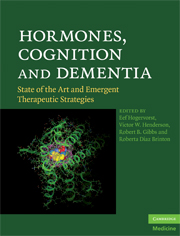Book contents
- Hormones, Cognition and Dementia
- Hormones, Cognition and Dementia
- Copyright page
- Contents
- Contributors
- Preface
- Section 1 Estrogens and cognition: perspectives and opportunities in the wake of the Women's Health Initiative Memory Study
- Section 2 Varieties of estrogenic therapy
- Section 3 Potential modulators and modifiers of estrogenic effects
- Section 4 Possible genetic factors related to hormone treatment effects
- Section 5 Testosterone, estradiol and men, and sex hormone binding globulin
- Chapter 19 Androgens and cognitive functioning in women
- Chapter 20 The role of estradiol in testosterone treatment
- Chapter 21 Endogenous testosterone levels and cognitive aging in men
- Chapter 22 Clinical trials and neuroimaging studies of testosterone in men: insights into effects on verbal memory
- Chapter 23 Testosterone therapy and Alzheimer's disease: potential for treatment and prevention in women
- Chapter 24 Endogenous estradiol and dementia in elderly men: the roles of vascular risk, sex hormone binding globulin, and aromatase activity
- Chapter 25 Testosterone regulates Alzheimer's disease pathogenesis
- Section 6 Gonadotropin effects
- Index
- Plate Section
Chapter 20 - The role of estradiol in testosterone treatment
from Section 5 - Testosterone, estradiol and men, and sex hormone binding globulin
Published online by Cambridge University Press: 06 July 2010
- Hormones, Cognition and Dementia
- Hormones, Cognition and Dementia
- Copyright page
- Contents
- Contributors
- Preface
- Section 1 Estrogens and cognition: perspectives and opportunities in the wake of the Women's Health Initiative Memory Study
- Section 2 Varieties of estrogenic therapy
- Section 3 Potential modulators and modifiers of estrogenic effects
- Section 4 Possible genetic factors related to hormone treatment effects
- Section 5 Testosterone, estradiol and men, and sex hormone binding globulin
- Chapter 19 Androgens and cognitive functioning in women
- Chapter 20 The role of estradiol in testosterone treatment
- Chapter 21 Endogenous testosterone levels and cognitive aging in men
- Chapter 22 Clinical trials and neuroimaging studies of testosterone in men: insights into effects on verbal memory
- Chapter 23 Testosterone therapy and Alzheimer's disease: potential for treatment and prevention in women
- Chapter 24 Endogenous estradiol and dementia in elderly men: the roles of vascular risk, sex hormone binding globulin, and aromatase activity
- Chapter 25 Testosterone regulates Alzheimer's disease pathogenesis
- Section 6 Gonadotropin effects
- Index
- Plate Section
Summary
Cherrier describes several mechanisms by which testosterone can affect the brain and other target tissues. By binding to classic intracellular androgen receptors, testosterone regulates transcription of target genes. Rapid, non-genomic effects of testosterone may involve membrane receptors. Dihydrotestosterone, a testosterone metabolite, is a more potent ligand for the androgen receptor. Testosterone can also be converted to estradiol, and estradiol in turn can affect the brain by binding to estrogen receptors or by acting through non-genomic mechanisms. In this chapter, Cherrier also reviews clinical research on testosterone and cognition, focusing on studies in men in which these different modes of testosterone action can – in part – be teased apart. Her review emphasizes studies that look specifically at potential mediating effects of estradiol. MMC supported in part by NIA R01AG027156.
- Type
- Chapter
- Information
- Hormones, Cognition and DementiaState of the Art and Emergent Therapeutic Strategies, pp. 187 - 196Publisher: Cambridge University PressPrint publication year: 2009

